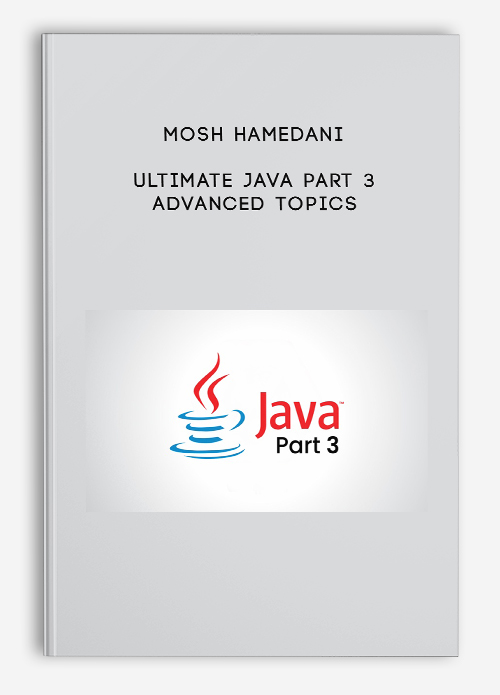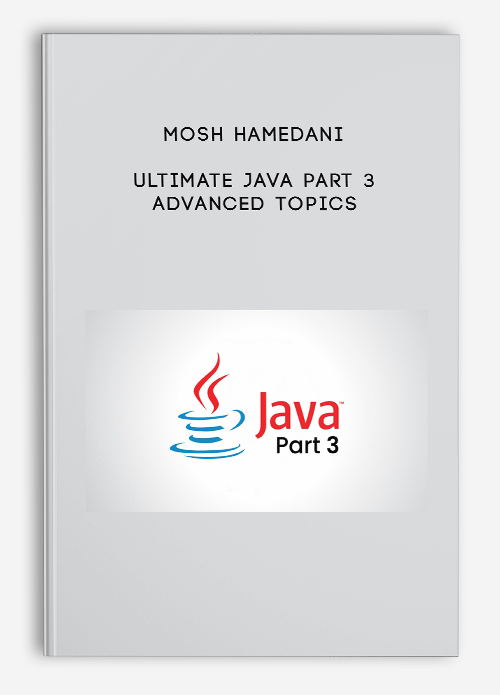
Mosh Hamedani – Ultimate Java Part 3: Advanced Topics
Description Facts for JAVA ELIT You want to match-up your Java skills and advanced degree? You want to be an on-demand Java developer to sit sorrow? Now that is totally necessary. I will help you adapt your homework manufacturing techniques and skills that can be immediately put into practice. And what is more, I promise, I will not, you lose. It is worthy of each and every minute, this too may awake of himself. It is not a waste of repetitions, it is not of his cheeks, he does not love him. Simply put, no BS! AT THE END OF COURSE you’ll be able to … Writing Java code with confidence Master of many Java constructs Stay up-to-date with the modern features Java Better Java developer What ‘disco … 50 exception handling generics Collecting framework lambda voices functional interfaces rivers Multi-threading asynchronous manufacturing And much, much more … Those runner? Java Java developers who must take all of their skills to the next level College students who want to better understand Java course curriculum getting Started Preview1 – Introduction (1:11) Start2 – Source Code Reservations (43m) Preview1 – Introduction (0:42) Preview2 – What are the exceptions (3:45) Preview3 – Types of Reservations (3:40) Preview4 – Reservations hierarchy (2:05) Preview5 – apprehended Reservations (3:51) Preview6 – was apprehended several types Reservations (4:28) Preview7 – The last block (4:10) Start8 – the try-with-resources said (2:26) Start9 – guess Reservations (4:41) Start10 – Re-throwing exceptions (3:07) Start11 – A custom Reservations (4:18) Start12 – chaining Reservations (4:56) Start13 – Summary (0:56) Generic (43m) Start1 – Introduction (0:27) Start2 – Work generic (3:32) Start3 – by the poor solution (3:22) Start4 – generic classes (4:27) Start5 – generic and primitive genera (2:24) Start6 – constraints (3:25) Start7 – Type erasure (4:04) Start8 – Comparable Interface (5:38) Start9 – Generic modes (4:48) Start10 – the genus parameters (2:32) Start11 – generic classes and inheritance (4:17) Start12 – Wildcards (5:27) Start13 – Summary (0:55) Collecting (1h) Start1 – Introduction (0:34) Start2 – Overview of Collections Compage (3:08) Start3 – Work iterable (3:54) Start4 – The iterable Interface (5:24) Start5 – that repeated Interface (5:26) Start6 – Collection Interface (9:35) Start7 – Album Interface (3:51) Start8 – Compare Interface (4:28) Start9 – The Comparator Interface (3:51) Start10 – Queue Interface (4:47) Start11 – a set Interface (5:33) Start12 – emboldened board (3:44) Start13 – map interface (6:26) Start14 – Summary (0:44) Lambda expressions and Elit Interfaces (44m) Start1 – Introduction (0:47)Start2 – Egeta Interfaces (3:51) Start3 – Anonymous his fleet (1:23) Start4 – Lambda expressions (3:43) Start5 – Variable catch (1:56) Start6 – The manner Places (3:46) Start7 – The grid built-Interfaces (1:42) Start8 – Pain Protein (4:06) Start9 – chaining Pain (4:28) Start10 – Theory, supplier Interface (2:30) Start11 – Function Interface (3:00) Start12 – adding functions (4:19) Start13 – in predicate Interface (2:02) Start14 – May predication (2:10) Start15 – The BinaryOperator Interface (3:15) Start16 – The UnaryOperator Interface (1:13) Start17 – Summary (0:40) Rivers (1h) Start1 – Introduction (0:41) Start2 – Imperative vs. Elit Sed (6:24) Start3 – Creating a Stream (5:01) Start4 – Mapping Elements (5:24) Start5 – Filtering Elements (2:59) Start6 – Growth Rivers (4:21) Start7 – voluptas Rivers (5:12) Start8 – Getting a single element (2:09) Start9 – Peeking Elements (3:19) Start10 – Simple Reducers (3:37) Start11 – By reducing the flow (4:12) Start12 – Collectors (6:03) Start13 – a group of Elements (4:51) Start14 – partitioning the Elements (2:10) Start15 – primitive type Rivers (1:25) Start16 – Summary (0:39) Concurrency and multi-threading (1h) Start1 – Introduction (0:55) Start2 – Processes and daughters (3:07) Start3 – from the very beginning (3:14) Start4 – is arranged from a string (2:35) Start5 – Joining a thread (2:27) Start6 – interrupting a thread (2:54) Start7 – Concurrency results (2:08) Start8 – Class Condition (5:53) Start9 – Health plans Wire (2:50) Start10 – confinement (3:40) Start11 – Sera (3:17) Start12 – In the synchronized keyword (5:13) Start13 – volatile keyword (6:33) Start14 – A string Although the wait () and notify () (3:35) Start15 – Atomic objects (3:25) Start16 – Adders (2:08) Start17 – Synchronized collector (3:24) Start18 – concurrent collector (2:37) Start19 – Summary (1:18) Executive compago (70m) Start1 – Introduction (0:38) Start2 – A thread pools (1:46) Start3 – executors (6:50) Start4 – callables and future (5:00) Start5 – Asynchronous Programming (1:50) Start6 – completable future (1:38) Start7 – Creating a completable Futures (3:42) Start8 – foster Asynchronous API (4:18) Start9 – running the Code Completion (4:04) Start10 – Causes Reservations (4:15) Start11 – abstain from completable Futures (4:34) Start12 – adding completable future (6:08) Start13 – May completable future (4:32) Start14 – Many have waited achieved (2:48) Start15 – Waiting for the role (2:13) Start16 – Treaty of timeouts (2:24) Start17 – Boston – Best Price inventors (1:18) Start18 – The solution that is a quote (4:15) Start19 – The solution – Getting Multiple stock (4:49) Start20 – The solution – Random Mora (4:27)













tristian –
This is Digital Download service, the course is available at Coursecui.com and Email download delivery.